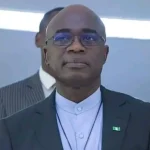The new minimum wage, pensions, and gratuities are expected to cost the federal government N3 trillion.
This was revealed on Friday by Atiku Bagudu, the Minister of Budget and Economic Planning, in a meeting with Olamilekan Adeola, the chair of the Senate Committee on Appropriations.
During the meeting, the minister gave the committee an overview of the recently revised 2024 budget.
Recall that on Thursday, President Bola Tinubu approved a new minimum salary of N70,000 for Nigerian workers following a meeting with the leaders of the Nigeria Labour Congress and the Trade Union Congress. In addition, the president promised to reevaluate the federal minimum wage statute every three years.
On Wednesday, the National Assembly’s two chambers approved an adjustment to the 2024 budget totaling N6.2 trillion for first and second readings, bringing the total budget size up to N33.7 trillion.
In a letter to the Senate, Tinubu requested the removal of N3.2 trillion for capital expenditures from the Consolidated Revenue Fund. The letter was read aloud by Senate President Godswill Akpabio. He also asked for an additional N3 trillion in recurring expenses for the year that ends on December 31, 2024.
The Senate granted first and second readings to the demands made in the form of executive bills, and directed the Appropriations and Finance committees to gather more legislative input and provide a report in a week for prompt consideration. The Senate Leader, Opeyemi Bamidele, led the debate on the Appropriations Amendment Bill and stated that the amendment aimed to authorize the issue of N3.2 trillion for capital expenditures and N3 trillion for recurrent expenditures from the consolidated fund. He clarified that this will assist in financing public welfare, education, healthcare access, and capital infrastructure development projects.
In support of the legislation, Senator Adamu Aliero underlined the necessity to finance the anticipated minimum wage for workers. The importance of financing the personnel expenditures resulting from the minimum wage modification was emphasized by Senator Adams Oshiomhole. He emphasized that in order to avoid financial shortages, the increase in personnel expenditures needed legal support.
The minister announced during the Senate Committee on Appropriations’ hearing on Friday that the newly proposed budget additions will be financed by profit that has already been set aside rather than by taking out loans.
Bagudu explained that priorities were given to projects that would open up roads for investments and emergencies, while other road projects would be addressed in subsequent batches. He highlighted the country’s historical underinvestment in infrastructure as a root cause of recent problems and commended President Tinubu for addressing the infrastructure deficit.
Bagudu gave his word that when money became available, the Federal Executive Council would continue to authorize funding for additional road projects. He gave a sector-by-sector summary of the N3.2 trillion Renewed Hope Infrastructure Projects and the N3 trillion increase in the budget’s recurrent section.
Senator Adeola asked for a thorough explanation of the N6.2tn approval and confirmed that the government can pay the budget until 2024.
Both houses of the National Assembly will discuss this breakdown, which is scheduled for submission the following week. The ministries, departments, and agencies would defend their budget allocations before the relevant Senate committees, according to Senate Spokesperson Senator Yemi Adaramodu.
While the capital component of N3.2tn will improve current road projects on state and federal routes, such as coastal roads, the Sokoto-Badagry road, railway development, and dam irrigation, the recurring budget of N3tn will pay for the minimum wage, pensions, and gratuities.
On Friday night, the Nigeria Labour Congress declared that it was an act of solidarity to support Tinubu’s proposed N70,000 minimum wage.
This was announced by the congress in a statement following the National Executive Council meeting. The NLC said in the statement, which was signed by Joe Ajaero, National President, that it will always stand out for the rights of Nigerian workers.
The statement read, “NEC-in-session concluded that this decision, though challenging and far from our initial demand, was made in the spirit of solidarity and sacrifice for the Nigerian masses to avert a threatened further hike in the price of petrol, which would inflict more hardship on the already suffering masses.
“Once again, NEC-in-session restates the commitment of the NLC to continue standing resolutely in its mission to defend and advance the rights of Nigerian workers and the Nigerian people at all times.
“It therefore calls on all Nigerians to unite in this cause and to hold our leaders accountable to the same standards of sacrifice and service.”
Additionally, the Nigeria Labour Congress’s Lagos State Chapter has encouraged the state government to take the unique characteristics of the state into account when implementing the new N70,000 minimum wage.
The NLC’s state chairman, Mrs. Funmi Sessi, told the News Agency of Nigeria on Friday in Lagos that the state’s workforce could not be supported by President Bola Tinubu’s approved N70,000 minimum salary.
“We, in Lagos State, still need to negotiate further with the government on issues such as rent, transportation and feeding. The government needs to look critically at our wage and add the ‘Lagos factor’.
“We know that if Ogun, Oyo, Edo, and Ekiti are paying the N70,000 stipulated by law, for Lagos, Kano, Rivers, and Abuja, there will always be that special factor for their allowances.
“So, we use this medium to appeal to our loving and good Governor of Lagos State, Babajide Sanwo-Olu, who is always willing to appreciate the good works of workers and alleviate their sufferings.
“We want to tell the governor that the ‘Lagos factor’ should be considered for the workers in the state. N70,000 is not sustainable for workers residing in the state.
“We will, however, continue to engage and dialogue until what we feel will be best for the workers is achieved,” she said.




